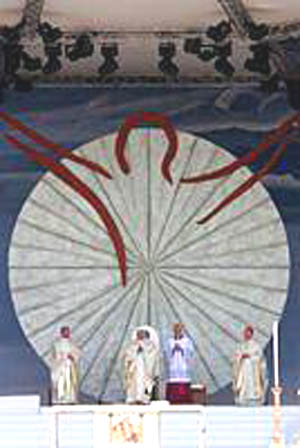 |
NEWS: June 23, 2005
Bird’s Eye View of the News
Atila Sinke Guimarães
BENEDICT XVI’S SURPRISES FOR THE FUTURE - “I am certain that Benedict XVI will cause us surprises regarding the [conservative] stereotypes with which he has too hastily been labeled.” These were the words of Cardinal Carlo Maria Martini, retired Archbishop of Milan and one of the most outspoken figures of the left-wing of Progressivism in the Church. He was responding to a question of a reporter from La Repubblica soon after the conclave ended.
Asked to explain the reasons for the remark, Martini sent this coded message:
“I am sure that the great responsibility that weighs on the shoulders of the new Pope will make him increasingly sensitive to the problems that disquiet the hearts of believers and non-believers, and it is probable that he will open unusual roads for them” (La Repubblica, April 26, 2005 in Adista, May 7, 2005, p. 8).
I was wondering what kind of surprises these would be, when Pope Benedict XVI made a trip to Bari, in southern Italy. A Eucharist Congress was taking place there, and he took the opportunity to say a Mass on May 29.
At that same Congress, Cardinal Walter Kasper, the Pope’s countryman and head of the ecumenical office, spoke at an inter-confessional ceremony on May 25. He proposed that a synod between Catholics and the so-called “Orthodox” take place in Bari.

Benedict XVI celebrating a Mass in Bari, May 29, 2005. The ambiguous symbol at the background may be interpreted either as a host or a Buddhist Japanese chrysanthemum |
This would repeat another synod between Catholics and Schismatics that took place in 1098 in that same city which dealt with points of disagreement between the two confessions. So, Kasper thought it possible that a “synod of reconciliation” could occur today at the same place (National Catholic Reporter, John Allen, June 2, online).
Cardinal Kasper said:
"Why not hope that here, in Bari, 1,000 years after the synod of 1098, in 2098 - we might again celebrate a synod of Greek and Latin bishops, a synod of reconciliation? And why not before this date?" (Zenit, May 26, 2005).
He added:
"I am profoundly convinced that after the great efforts and important steps taken by John Paul II, the new Pope Benedict XVI will smooth and open the way for such a prospect" (ibid.)
It is worth noting that Protestants, also present at the meeting, were invited to join the same “alliance to rediscover the Christian roots of Europe.”
But Kasper did not stop at these generic aims. He went on to articulate a very precise point that would be the real reason for the synod. He addressed the question of changing the Petrine Papacy.
Doing this, Kasper reiterated John Paul II's proposal during his visit to Bari in 1984. Afterward, JPII repeated the same proposition in his 1995 encyclical Ut Unum Sint: He called on Schismatics and Protestants "to find a way of exercising the primacy which, while in no way renouncing what is essential to its mission, is nonetheless open to a new situation."
With this precedent as argument, Kasper asked the attendants of the inter-confessional conference:
"What is impeding us from starting today, here in Bari, to discuss this proposal?" Why not reflect together on an osmosis [reciprocal action] between the principle of synodality and collegiality and the Petrine principle?" (ibid.)
That is, his proposal was an official attempt to bring together Catholics, Schismatics, and Protestants; an effort to gather these three confessions in a kind of “ecumenical council.”
Benedict XVI clearly endorsed Kasper’s initiative in the homily of his Mass, when he stated that he would use all his energy to “rebuild the full and visible unity of all the followers of Christ” (The Tablet, online edition, June 4, 2005).
Here we have, in my opinion, one of the surprises that Benedict XVI would like to spring: a Pan-Christian Ecumenical Council.
I am not the only one to interpret that convoking this kind of “council” would be a goal of the new Pope. Fr. Giuseppe Alberigo, a well-known contemporary Italian historian, said the same in an interview to the Swiss newspaper Corriere del Ticino. The journalist asked him if he thought Benedict XVI would prepare a council to “re-ignite the Church after John Paul II.” Alberigo replied:
“Perhaps he might better move toward a Christian Council, i.e., not only Catholic but with all the Christian confessions: Protestants, Anglicans, and Orthodox” (Adista, May 7, 2005, p. 11).
I think that this will be one of the planned “surprises” to which Cardinal Martini referred.
A CRUEL JULIET TURNS HER BACK ON A PINING ROMEO – While Benedict XVI sent his best crooner – Kasper – for this romantic serenade to the Schismatics, they did not show up on their balcony to respond to his love songs…
In fact, Kasper’s invitation raised no enthusiasm among the Russian Schismatics. A top Russian Orthodox Church official expressed caution about the prospect of any Catholic-Orthodox ties. Fr. Vsevolod Chaplin, head of the Moscow patriarchate’s foreign relations department, said that Moscow is ready to “revitalize the dialogue” with Rome, but cautioned that there are “theological differences that cannot be solved very quickly” (The Tablet, online edition, June 4, 2005). In other words, slow down!
Let me point out here that the Russian Schismatics are the most numerous branches of the Schismatics, claiming to have more than 80 million followers. Without their support, no accord can be made with the various other smaller, fragmented “Orthodox Churches.”
The first surprise His Holiness Benedict XVI was preparing as part of his progressivist agenda went awry. Juliet turned her back on Romeo…
Let’s wait to see what the next one will be.


| Related Works of Interest
|
News |
Home | Books | CDs
| Search | Contact Us
| Donate

©2002- Tradition in Action, Inc. All Rights Reserved
|
 |
|